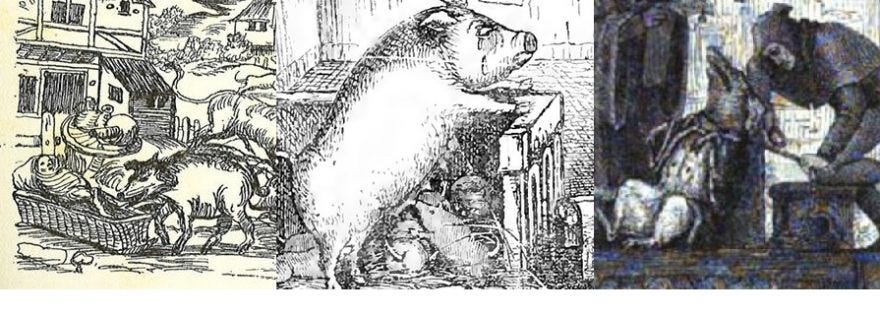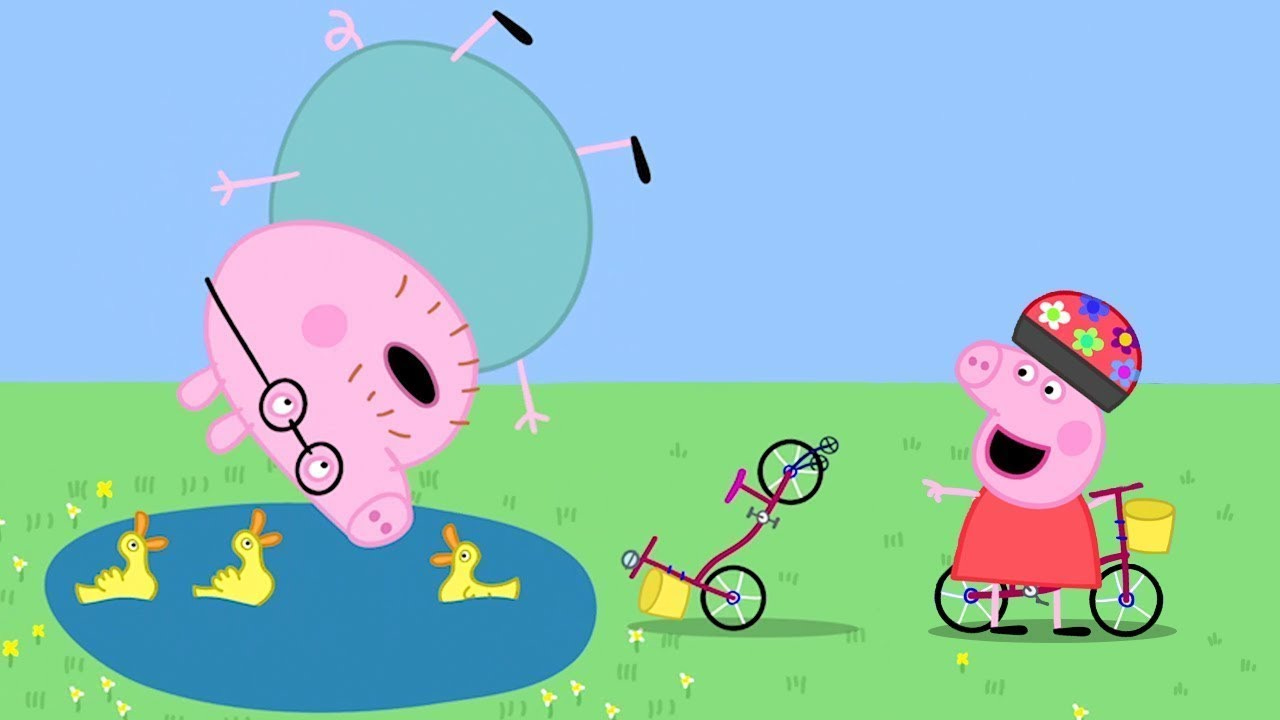“The Day the Pig Fell into the Well” (The Stories of John Cheever)
A story about storytelling
“In the summer, when the Nudd family gathered at Whitebeach Camp, in the Adirondacks, there was always a night when one of them would ask 'Remember the day the pig fell into the well?' Then, as if the opening note of a sextet had been sounded, the others would all rush into their favorite parts, like those families who sing Gilbert and Sullivan, and the recital would go on for an hour or more.”
Stories are never just stories. Stories reflect their narrators. When we tell stories, we make choices – purposeful and unconscious – based on knowledge, bias, mood, obsessions and audience. You can talk about crashing your car into a flag pole and the resulting anecdote can be funny, sad, reflective or heartbreaking. Authors have been exploring this dynamic since Chaucer wrote The Canterbury Tales with every tale reflecting on the position of the narrator.
Some stories survive centuries, staying fresh through different audiences and generations. Most stories fade. No one is eagerly writing down your class reunion anecdote about getting wasted and throwing toilet paper at your friend's house. When the Nudd Family gathers to tell their story about the pig falling in the well, it's an ephemeral tale that will die with the last Nudd. They are the only people who care. No one else would tolerate an hour of the pig story.
In Cheever's hands, the story becomes a gateway to reveal the Nudds in all their failures and pathos. Cheever, as omniscient narrator, moves back and forth in time mixing and matching the events of these people. The poor pig is secondary to the time when all the Nudds were together and alive and hopeful.
Randy won the pig in a fair lottery. Mrs. Nudd confuses the details but no one corrects her. Randy was going to build a pen but his fiancee, Pamela, distracts him so he puts the pig in a tool shed. The pig escaped and ran right to the well where family friend and local Russell Young tried to rescue the pig with a slipknot. Russell fails and the pig drowns.
At the same time, Mr. Nudd & Aunt Martha were coming to the house via a boat that capsized, forcing them to swim. Hartley Nudd left a bucket with a live pike on the steps. The drunk cook tripped over it. Aunt Martha hung up her wet corset. Finally, Pamela entered the scene to announce her engagement to Randy.
Every character doubles as their pig day selves and their lives since then. In keeping with the themes, the children – Randy, Hartley, Esther and Joan – are named while their parents are always Mr. & Mrs. Nudd. Hartley had a fish. Randy was getting engaged. Joan was months away from a surprise marriage and Esther was playing tennis, which effectively ended her designation as “the fat sister.”
By the last recitation of the pig story, Hartley and Aunt Martha are dead. We don't know how Aunt Martha died, but Hartley died in WWII. This might be the only Cheever story where WWII actually affects the characters. In the rare moments that Cheever mentions the war, there's usually a “he went to war and came home” elision. Their parts in the story are tangential at best. Hartley provides a fish in a bucket and Aunt Martha hangs up her wet corset. Had they lived, they might have expanded on the story, but death has diminished their roles. Mrs. Coolidge and Nora the cook have also vanished from the family gatherings but maintain walk-on parts in the pig story.
In keeping with the themes, Mr. & Mrs. Nudd seem to end their stories with the day the pig fell in the well. Cheever doesn't tell us much about these characters after that day. Before that day, Mr. Nudd had been forcibly retired by his company. Mrs. Nudd, supporting her husband, hated his business partners. Beyond that day, we learn that Mrs. Nudd didn't care for Pamela and that she had thoughts about her children, but all of her personal stories happened before that day.
Of the three surviving children, Randy was the most pathetic. Before the pig, he had just been kicked out of college for not saying which one of his friends threw a grapefruit at a socialist lecturer. He marries Pamela and worships “his skinny wife” who annoys his mother and sisters. Randy can't hold a job by the end of the story he's obsessed with the fact that he's 37 “as if the passage of time over his head was singular, interesting and a dirty trick.”
Esther and Russell Young are the closest this story comes to central characters. Esther falls for Russell when he tries to rescue the pig. The following summer, Esther wants to lose her virginity and seduces Russell. They spend the season having sex in her bed, eventually assuming that her parents know and don't care. They are wrong on both counts. For Esther, it's a nice summer memory. She knows that she's never going to marry Russell because she can't live in Whitebeach and he's never going to leave.
She tells Russell about her feelings. She makes her position very clear, but nothing inspires self-deception as much as love. Russell spends months pining for Esther, writing her and calling her to ask her to marry him. Esther never wavers. Yet, Russell continues to delude himself to the point that when Esther doesn't return the next summer, Russell believes that her parents purposefully kept them apart. Rejection hurts. Better the disapproving parents dooming young romance trope.
Ironically, Mr. & Mrs. Nudd give Russell's delusions ample support when they finally return to White Beach and don't invite him to Nudd gatherings. He's working at his dad's hardware store and they just can't pretend that class differences don't matter. When he's delivering milk, they can think that he's one of the family but when he's in his dad's store, he's a townie, someone who exists to cater to the summer people. The following year, the class privilege becomes even more obvious as the Nudds decide to hate the Young family for destroying the best picnic area in town.
Hewitt’s Point was across the lake and three miles to the south of Whitebeach Camp, and the development would not affect the Nudds’ property, but Hewitt’s Point was the place where they had always gone for their picnics, and they did not like to see the grove cut and replaced with tourist hutches. They were all bitterly disappointed in Russell. They had thought of him as a native who loved his hills. They had expected him, as a kind of foster son, to share their summery lack of interest in money and it was a double blow to have him appear mercenary and to have the subject of his transactions the grove on Hewitt’s Point, where they had enjoyed so many innocent picnics.
Of course, the Nudds can't imagine anyone caring about money. Mr. Nudd is forcibly retired from his CEO position, but it doesn't hurt them financially. Randy's string of bad jobs doesn't affect him. Joan and Esther travel the world with ease. The Nudds' lives will never be upended by a hospital stay, a sick cat, a broken muffler or a higher-than-average electric bill. Without financial worries, their anxiety turns to prestige and picnic areas.
The Nudds hate Russell until Mrs. Nudd sees Russell and wishes that he died in the Pacific instead of Hartley. This thought sets off her WASP guilt over extreme emotions and she invites Russell to family gatherings. She doesn't actually forgive him for destroying her favorite picnic spot, but she drops the spite.
Finally, we have Joan. Joan was the pretty sister growing up and her role in the pig story is never clear. Like the protagonist of O Youth and Beauty, she spends her adult life wondering what happened. She was loved for her beauty and never had to understand herself. Her adult life is spent in marriages and divorces and attempts to figure herself out. One day she blames childhood jealousy and another day, she claims that her neurosis began when a maid undressed in front of her. Cheever implies that she's a lesbian with a partner named Helen. Joan wants to spend the winter at the summer home with Helen but her father forbids it. Joan is an adult woman in her late 30s asking her father's permission to share the family's vacation home with her (maybe) girlfriend.
With the last line, Cheever pulls out some serious tears in the rain writing. “The room with the people in it looked enduring and secure, although in the morning they would all be gone.” The family will leave and go home. Maybe they will come back the next summer. They will tell the story again, but inevitably the Nudd family will die and the story will die with them. No one but the Nudds care about that poor dead pig.
There’s a film with a similar title but I think it’s more inspired by this story than adapted.
For slightly different stories, here’s my self-published collection of X-mas stories.








